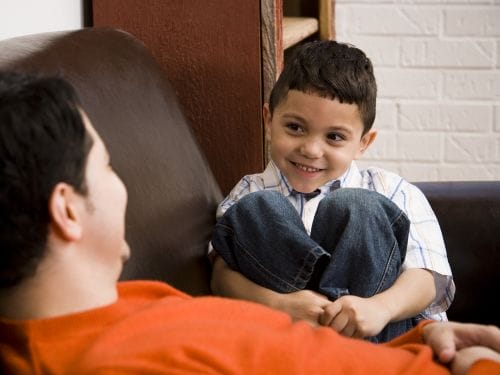Guest Post: Making After School Conversations Count

Z. Andrew Jatau is a Licensed Professional Counselor and an adjunct professor who currently owns and operates a private practice in Virginia Beach, VA. He is also the founder of Mylemarks, a company dedicated to creating materials for parents and professionals to help in developing emotionally healthy children.
Summer break is almost over and school will be back in session in no time! Transitioning back to school is a big adjustment for children and parents alike. The summer break often provides ample time for family bonding, but the start of school signals more structured days and less quality time spent between parent and child.
During school months, children are more involved with clubs, sports, homework, and social activities. The opportunities to sit and connect with your child diminish and get relegated to a few sporadic moments throughout the evening.
Though the allotted time for quality conversation might decrease, there are still ways to be able to engage your child in meaningful and productive after school dialogue.
Don’t settle for “fine” or “good”.
“How was your day?” is asked by parents in hopes of evoking a well-detailed response from their child about their adventures during the day. Unfortunately, ‘how was your day’ is a closed-ended question, which means that it is designed to elicit a one-word response such as “fine” or “good”.
Rather than just asking how their day was, ask open-ended questions that might lead to lengthier and more detailed responses.
“What happened in school today?”
“What was good or bad about your day?”
“What new thing did you learn in your class today?”
Attend to non-verbal communication.
As you are conversing with your child, they will be communicating non-verbally through their body language and voice tone. Non-verbal signals can send you messages about how your child truly is feeling. While they may tell you that everything went well in school today, their body language might be saying otherwise.
Be attentive to not only what they are saying, but how they are saying it. Gently confront them if you notice any incongruences between their words and actions. Give them an opportunity to be honest about how they really felt about their day.
“I know you said you had a good day, but I noticed that you were looking a bit sad. What might have happened today that made you sad?”
Use this as an opportunity to develop social and emotional skills.
There is always something that happens during your child’s day that can be used to promote social and emotional growth. Whenever they talk to you about their day, place an emphasis on the feelings behind the events rather than just focusing on the content. To foster empathy, ask them also to determine how others might have been feeling. This helps to grow your child’s feelings vocabulary.
“How did you feel when you found out that you got an ‘A+’ on the test?”
“How do you think your friend felt when he missed the bus this morning?”
It is also important to explore ways that your child handled conflict and frustration throughout the day. Discuss ways that he or she coped with certain situations and how it might be better handled in the future. Also, explore their use of social skills and how they dealt with challenges in their peer relationships.
Listen!
Having a quality conversation includes both you and your child’s commitment to providing each other with undivided attention. It is best to have a conversation free of distraction so that your child feels listened to. Encourage your child to put away any access to social media for a few minutes, and you do the same.
As your child is sharing their day with you, actively listen and show them that you are truly engaged in what they are saying. Active listening includes consistent eye contact, asking questions, and reflecting important pieces of their story.
Do it Often.
Your commitment to create this quality time with your child shows them that you value those few minutes together and that you care about what is happening in their life. Be consistent and make it a habit and it will become something that both you and your child look forward to each day!





